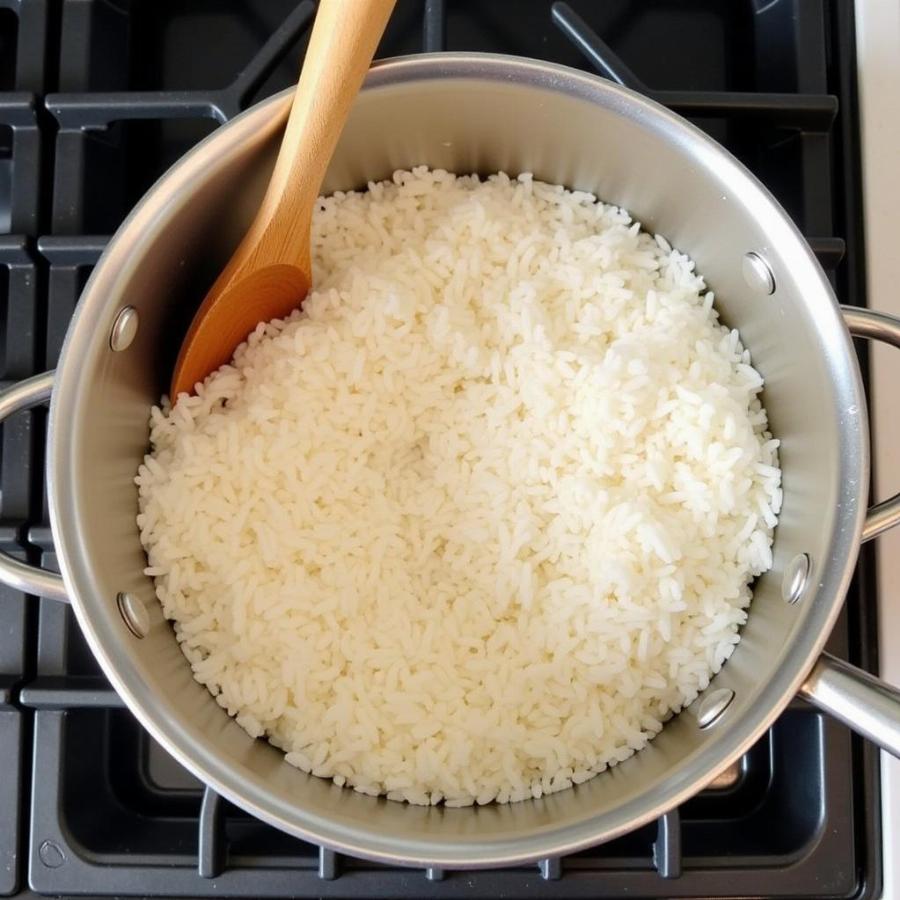Jasmine rice, with its fragrant aroma and slightly sweet taste, is a popular choice for humans. But what about our canine companions? Can dogs eat jasmine rice? The short answer is yes, in moderation. While not a necessary part of their diet, jasmine rice can be a safe and even beneficial addition to your dog’s meals under certain circumstances. Let’s delve deeper into the world of jasmine rice for dogs, exploring its benefits, potential risks, and how to incorporate it safely into your furry friend’s diet.
Can dogs have jasmine rice as a regular part of their meals? While jasmine rice offers some nutritional value, it shouldn’t be a primary ingredient in your dog’s food. A balanced, commercially available dog food formulated for your dog’s age and breed should provide all the necessary nutrients. Jasmine rice can be a helpful supplement, but not a replacement for a complete and balanced diet. Is jasmine rice okay for dogs with certain dietary restrictions? Yes, jasmine rice is generally gluten-free, making it a suitable option for dogs with gluten sensitivities.
The Benefits of Jasmine Rice for Dogs
Jasmine rice can offer several benefits for dogs, especially those experiencing digestive upset. It’s easily digestible and can help firm up stool in cases of diarrhea. The carbohydrates in jasmine rice provide a quick source of energy, which can be helpful for active dogs or those recovering from illness. It’s also a good source of B vitamins, which are essential for various bodily functions.
Potential Risks and Considerations
While generally safe, feeding too much jasmine rice can lead to weight gain due to its carbohydrate content. Always feed jasmine rice in moderation and as part of a balanced diet. Some dogs may have allergies or sensitivities to rice, so it’s essential to introduce it gradually and monitor for any adverse reactions. What are the signs of a rice allergy in dogs? Look out for itching, skin rashes, vomiting, or diarrhea. If you notice any of these symptoms after introducing jasmine rice, discontinue feeding and consult your veterinarian.
How to Prepare and Serve Jasmine Rice for Dogs
When preparing jasmine rice for your dog, cook it plain without any added seasonings or fats. Avoid adding salt, butter, or other ingredients that can be harmful to dogs. Cook the rice until it’s soft and easy to digest. You can mix a small amount of cooked jasmine rice with your dog’s regular food. Start with a small portion and gradually increase the amount if your dog tolerates it well.
 Preparing Plain Jasmine Rice for a Dog's Meal
Preparing Plain Jasmine Rice for a Dog's Meal
Can puppies have jasmine rice?
Yes, puppies can have jasmine rice, but it’s even more critical to introduce it slowly and in small quantities. Their digestive systems are still developing, and too much rice can cause digestive upset.
is jasmine rice okay for dogs provides further information on this topic.
Jasmine Rice for Dogs with Diarrhea
As mentioned earlier, jasmine rice can be beneficial for dogs experiencing diarrhea. Its blandness and easy digestibility can help soothe the digestive tract and firm up stool. How much jasmine rice should I give my dog with diarrhea? Consult your veterinarian for specific recommendations, but generally, a small amount mixed with their regular food is a good starting point.
can dogs have jasmine rice offers a more detailed discussion about feeding rice to dogs with digestive issues.
Alternatives to Jasmine Rice
If your dog doesn’t tolerate jasmine rice or you’re looking for other options, consider alternatives like plain cooked sweet potato or pumpkin. These are also easily digestible and can provide similar benefits.
Conclusion
Jasmine rice can be a healthy and occasional treat for dogs when fed in moderation. It can be particularly helpful for dogs with digestive upset, providing a bland and easily digestible source of energy and nutrients. Always consult with your veterinarian before making significant changes to your dog’s diet, especially if they have any underlying health conditions. Remember to introduce jasmine rice gradually and monitor your dog for any adverse reactions.
FAQ
- Can I feed my dog uncooked jasmine rice? No, uncooked rice can be difficult for dogs to digest and may cause digestive upset.
- Is brown rice better than jasmine rice for dogs? Both are safe, but brown rice has more fiber.
- Can I give my dog seasoned rice? No, avoid seasonings as they can be harmful to dogs.
- How often can I give my dog jasmine rice? Occasionally, as a treat or supplement.
- Can jasmine rice help my dog gain weight? Yes, but only if fed in excessive amounts. Use it judiciously.
- What should I do if my dog has an allergic reaction to rice? Discontinue feeding and contact your veterinarian immediately.
- Can I mix jasmine rice with other foods for my dog? Yes, you can mix it with plain cooked meats or vegetables.
Further Reading
For more information about dog nutrition and care, visit our water dog news page.
About Beaut Dogs
Beaut Dogs is your trusted source for all things canine, providing valuable information about dog breeds, care, and well-being. We are committed to empowering dog owners with the knowledge they need to provide the best possible care for their furry companions. When you need support, please contact us by Email at [email protected] so that Beaut Dogs can give you detailed and accurate answers. Visit us at https://beautdogs.com to discover the wonderful world of dogs and learn how to care for them best!